Essay: Applying Transtheoretical Model of Change (HLSC111)
VerifiedAdded on 2022/11/18
|9
|2053
|232
Essay
AI Summary
This essay examines the Transtheoretical Model of Change (TTM), also known as the Stages of Change Model, and its application within an evidence-based framework. The essay focuses on a case study of Harry, a 58-year-old male undergoing hip replacement surgery, to illustrate the practical application of the TTM. It explores the stages of change: pre-contemplation, contemplation, preparation, action, and maintenance, and how these stages relate to Harry's situation and his need to change his health behaviors. The essay also identifies the components of motivational interviewing, such as reflective listening and developing discrepancies, to assist Harry in adopting healthier habits. It emphasizes the importance of increasing self-esteem and intrinsic motivation to facilitate positive lifestyle changes, including dietary modifications and, ultimately, improving his overall health and well-being. The essay concludes by summarizing the use of TTM and motivational interviewing to bring about positive changes in Harry's behavior through a collaborative approach.
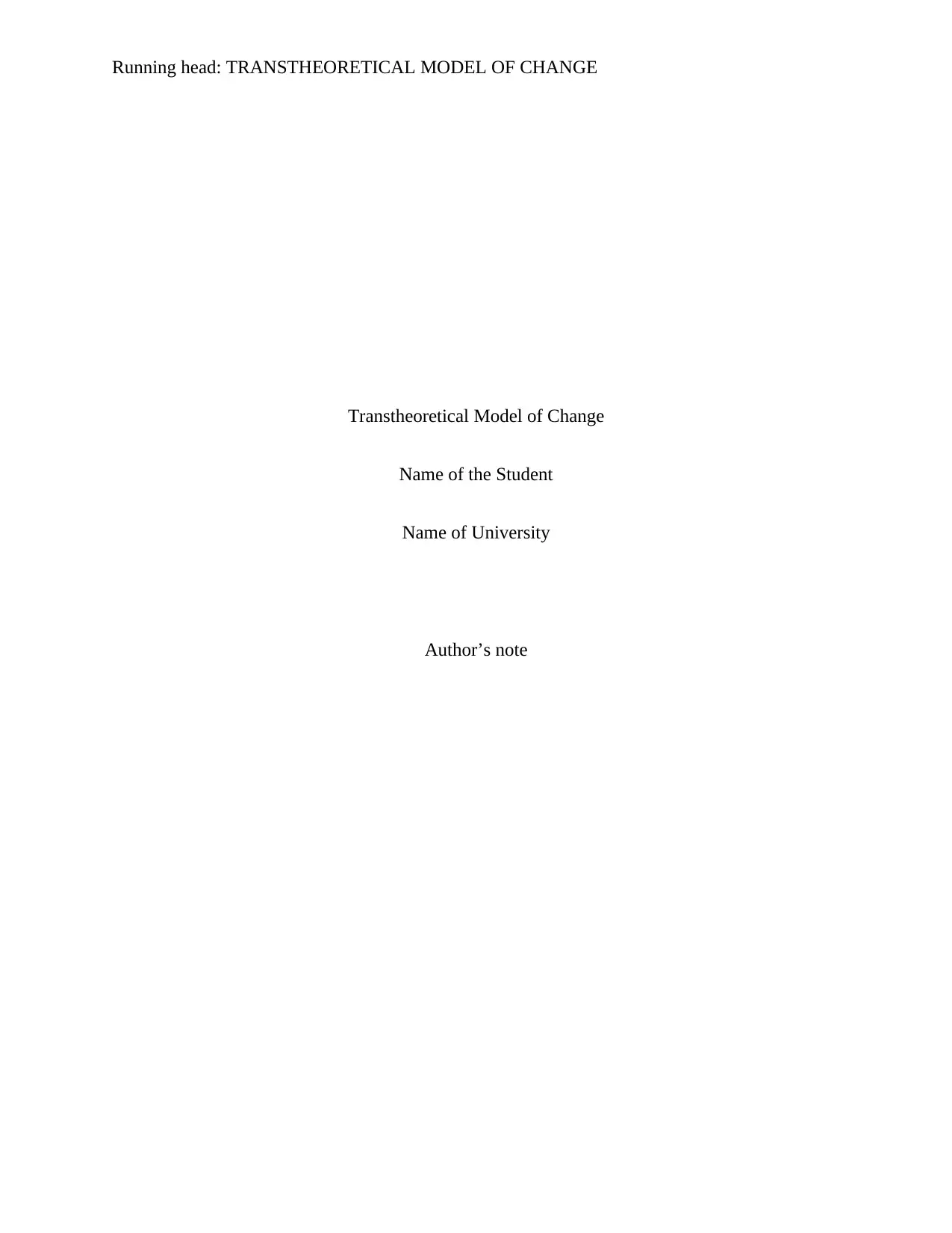
Running head: TRANSTHEORETICAL MODEL OF CHANGE
Transtheoretical Model of Change
Name of the Student
Name of University
Author’s note
Transtheoretical Model of Change
Name of the Student
Name of University
Author’s note
Paraphrase This Document
Need a fresh take? Get an instant paraphrase of this document with our AI Paraphraser
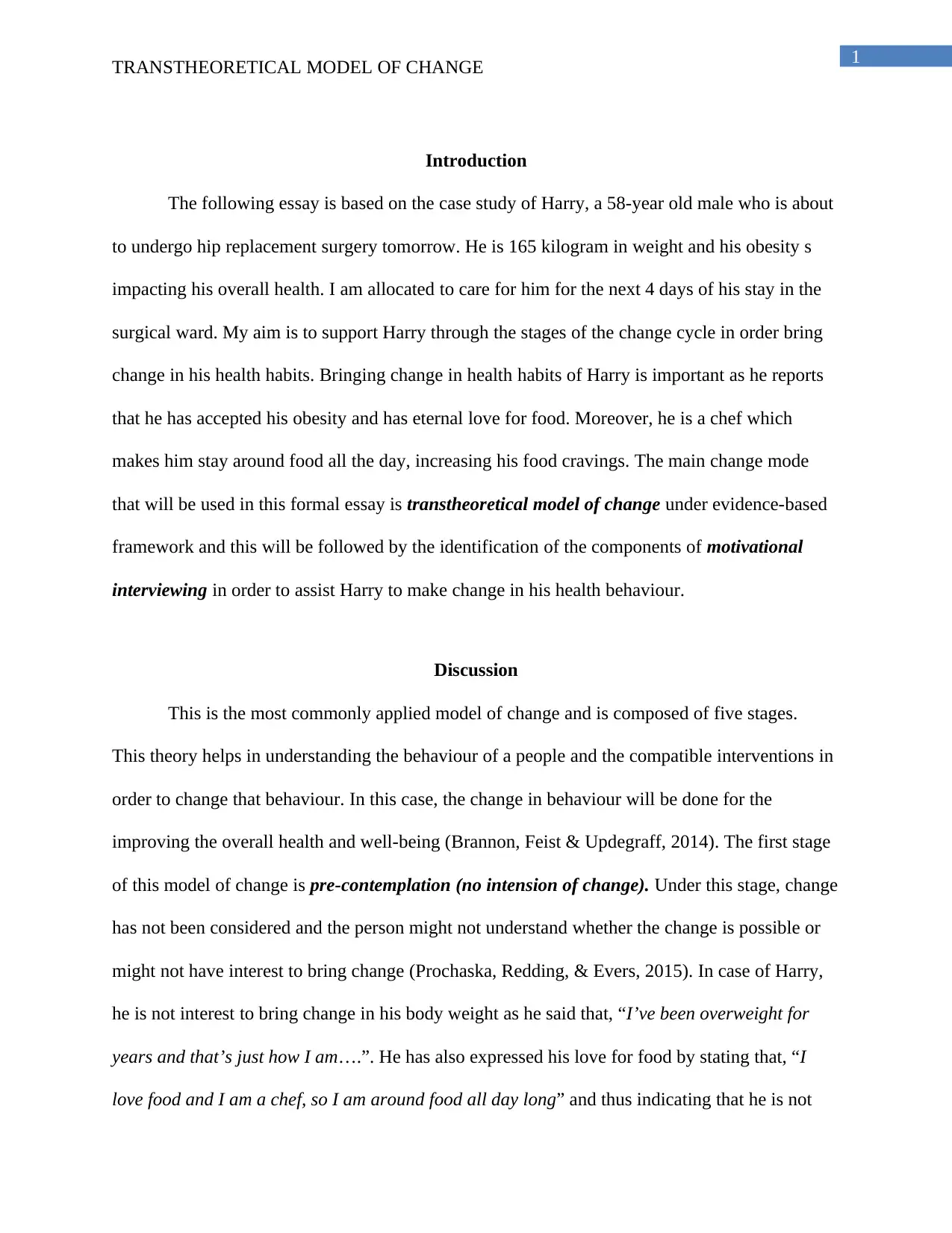
1
TRANSTHEORETICAL MODEL OF CHANGE
Introduction
The following essay is based on the case study of Harry, a 58-year old male who is about
to undergo hip replacement surgery tomorrow. He is 165 kilogram in weight and his obesity s
impacting his overall health. I am allocated to care for him for the next 4 days of his stay in the
surgical ward. My aim is to support Harry through the stages of the change cycle in order bring
change in his health habits. Bringing change in health habits of Harry is important as he reports
that he has accepted his obesity and has eternal love for food. Moreover, he is a chef which
makes him stay around food all the day, increasing his food cravings. The main change mode
that will be used in this formal essay is transtheoretical model of change under evidence-based
framework and this will be followed by the identification of the components of motivational
interviewing in order to assist Harry to make change in his health behaviour.
Discussion
This is the most commonly applied model of change and is composed of five stages.
This theory helps in understanding the behaviour of a people and the compatible interventions in
order to change that behaviour. In this case, the change in behaviour will be done for the
improving the overall health and well-being (Brannon, Feist & Updegraff, 2014). The first stage
of this model of change is pre-contemplation (no intension of change). Under this stage, change
has not been considered and the person might not understand whether the change is possible or
might not have interest to bring change (Prochaska, Redding, & Evers, 2015). In case of Harry,
he is not interest to bring change in his body weight as he said that, “I’ve been overweight for
years and that’s just how I am….”. He has also expressed his love for food by stating that, “I
love food and I am a chef, so I am around food all day long” and thus indicating that he is not
TRANSTHEORETICAL MODEL OF CHANGE
Introduction
The following essay is based on the case study of Harry, a 58-year old male who is about
to undergo hip replacement surgery tomorrow. He is 165 kilogram in weight and his obesity s
impacting his overall health. I am allocated to care for him for the next 4 days of his stay in the
surgical ward. My aim is to support Harry through the stages of the change cycle in order bring
change in his health habits. Bringing change in health habits of Harry is important as he reports
that he has accepted his obesity and has eternal love for food. Moreover, he is a chef which
makes him stay around food all the day, increasing his food cravings. The main change mode
that will be used in this formal essay is transtheoretical model of change under evidence-based
framework and this will be followed by the identification of the components of motivational
interviewing in order to assist Harry to make change in his health behaviour.
Discussion
This is the most commonly applied model of change and is composed of five stages.
This theory helps in understanding the behaviour of a people and the compatible interventions in
order to change that behaviour. In this case, the change in behaviour will be done for the
improving the overall health and well-being (Brannon, Feist & Updegraff, 2014). The first stage
of this model of change is pre-contemplation (no intension of change). Under this stage, change
has not been considered and the person might not understand whether the change is possible or
might not have interest to bring change (Prochaska, Redding, & Evers, 2015). In case of Harry,
he is not interest to bring change in his body weight as he said that, “I’ve been overweight for
years and that’s just how I am….”. He has also expressed his love for food by stating that, “I
love food and I am a chef, so I am around food all day long” and thus indicating that he is not
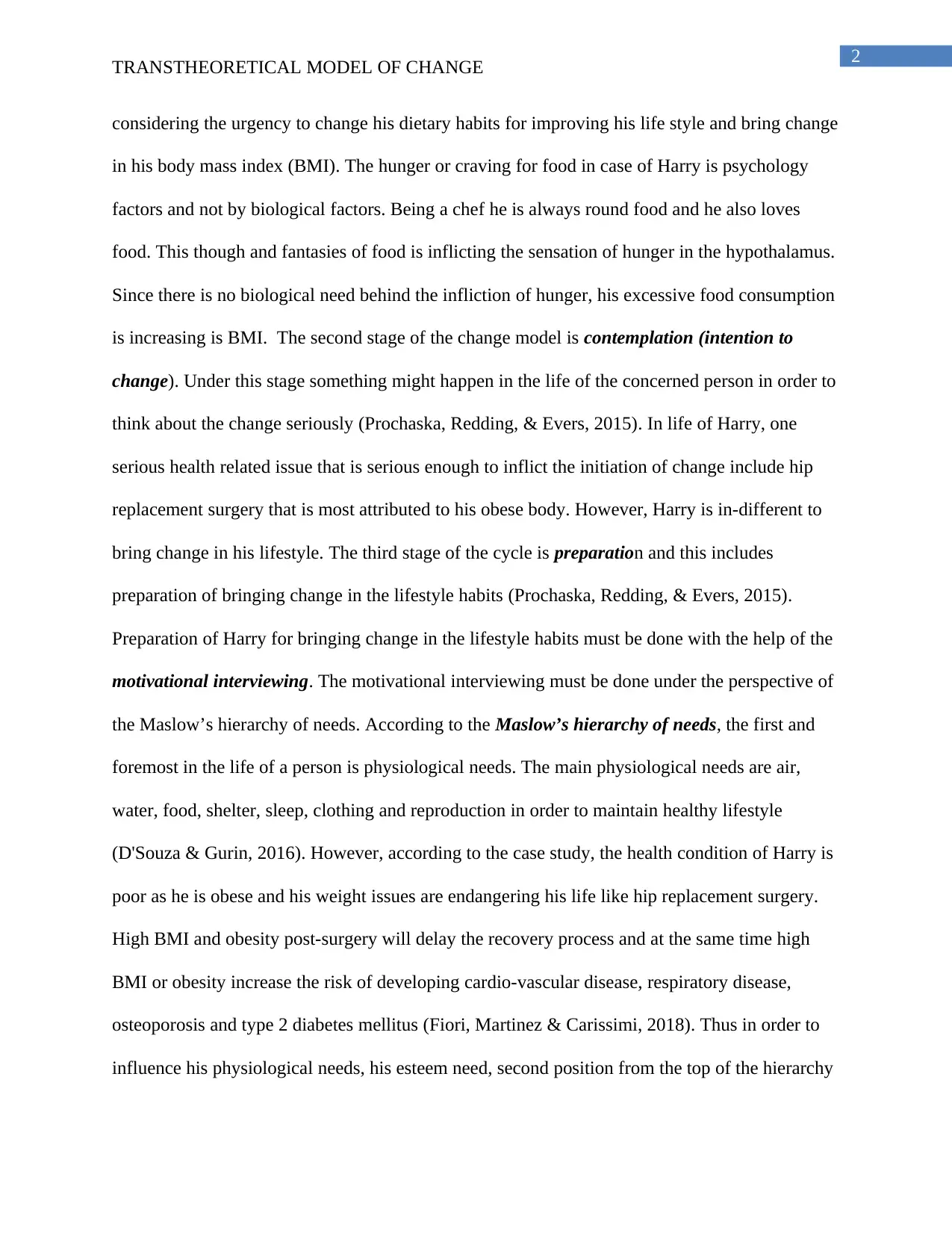
2
TRANSTHEORETICAL MODEL OF CHANGE
considering the urgency to change his dietary habits for improving his life style and bring change
in his body mass index (BMI). The hunger or craving for food in case of Harry is psychology
factors and not by biological factors. Being a chef he is always round food and he also loves
food. This though and fantasies of food is inflicting the sensation of hunger in the hypothalamus.
Since there is no biological need behind the infliction of hunger, his excessive food consumption
is increasing is BMI. The second stage of the change model is contemplation (intention to
change). Under this stage something might happen in the life of the concerned person in order to
think about the change seriously (Prochaska, Redding, & Evers, 2015). In life of Harry, one
serious health related issue that is serious enough to inflict the initiation of change include hip
replacement surgery that is most attributed to his obese body. However, Harry is in-different to
bring change in his lifestyle. The third stage of the cycle is preparation and this includes
preparation of bringing change in the lifestyle habits (Prochaska, Redding, & Evers, 2015).
Preparation of Harry for bringing change in the lifestyle habits must be done with the help of the
motivational interviewing. The motivational interviewing must be done under the perspective of
the Maslow’s hierarchy of needs. According to the Maslow’s hierarchy of needs, the first and
foremost in the life of a person is physiological needs. The main physiological needs are air,
water, food, shelter, sleep, clothing and reproduction in order to maintain healthy lifestyle
(D'Souza & Gurin, 2016). However, according to the case study, the health condition of Harry is
poor as he is obese and his weight issues are endangering his life like hip replacement surgery.
High BMI and obesity post-surgery will delay the recovery process and at the same time high
BMI or obesity increase the risk of developing cardio-vascular disease, respiratory disease,
osteoporosis and type 2 diabetes mellitus (Fiori, Martinez & Carissimi, 2018). Thus in order to
influence his physiological needs, his esteem need, second position from the top of the hierarchy
TRANSTHEORETICAL MODEL OF CHANGE
considering the urgency to change his dietary habits for improving his life style and bring change
in his body mass index (BMI). The hunger or craving for food in case of Harry is psychology
factors and not by biological factors. Being a chef he is always round food and he also loves
food. This though and fantasies of food is inflicting the sensation of hunger in the hypothalamus.
Since there is no biological need behind the infliction of hunger, his excessive food consumption
is increasing is BMI. The second stage of the change model is contemplation (intention to
change). Under this stage something might happen in the life of the concerned person in order to
think about the change seriously (Prochaska, Redding, & Evers, 2015). In life of Harry, one
serious health related issue that is serious enough to inflict the initiation of change include hip
replacement surgery that is most attributed to his obese body. However, Harry is in-different to
bring change in his lifestyle. The third stage of the cycle is preparation and this includes
preparation of bringing change in the lifestyle habits (Prochaska, Redding, & Evers, 2015).
Preparation of Harry for bringing change in the lifestyle habits must be done with the help of the
motivational interviewing. The motivational interviewing must be done under the perspective of
the Maslow’s hierarchy of needs. According to the Maslow’s hierarchy of needs, the first and
foremost in the life of a person is physiological needs. The main physiological needs are air,
water, food, shelter, sleep, clothing and reproduction in order to maintain healthy lifestyle
(D'Souza & Gurin, 2016). However, according to the case study, the health condition of Harry is
poor as he is obese and his weight issues are endangering his life like hip replacement surgery.
High BMI and obesity post-surgery will delay the recovery process and at the same time high
BMI or obesity increase the risk of developing cardio-vascular disease, respiratory disease,
osteoporosis and type 2 diabetes mellitus (Fiori, Martinez & Carissimi, 2018). Thus in order to
influence his physiological needs, his esteem need, second position from the top of the hierarchy
⊘ This is a preview!⊘
Do you want full access?
Subscribe today to unlock all pages.

Trusted by 1+ million students worldwide
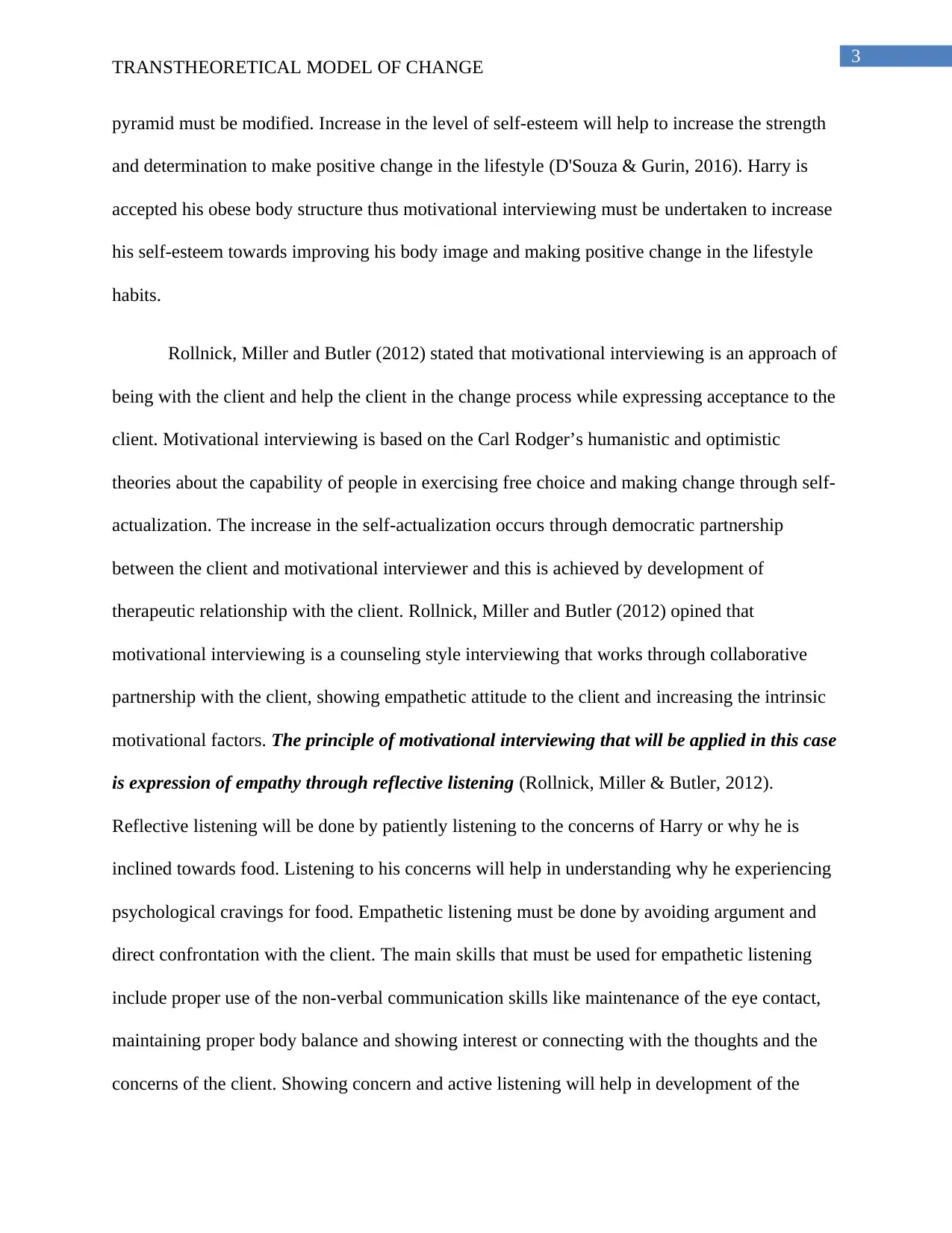
3
TRANSTHEORETICAL MODEL OF CHANGE
pyramid must be modified. Increase in the level of self-esteem will help to increase the strength
and determination to make positive change in the lifestyle (D'Souza & Gurin, 2016). Harry is
accepted his obese body structure thus motivational interviewing must be undertaken to increase
his self-esteem towards improving his body image and making positive change in the lifestyle
habits.
Rollnick, Miller and Butler (2012) stated that motivational interviewing is an approach of
being with the client and help the client in the change process while expressing acceptance to the
client. Motivational interviewing is based on the Carl Rodger’s humanistic and optimistic
theories about the capability of people in exercising free choice and making change through self-
actualization. The increase in the self-actualization occurs through democratic partnership
between the client and motivational interviewer and this is achieved by development of
therapeutic relationship with the client. Rollnick, Miller and Butler (2012) opined that
motivational interviewing is a counseling style interviewing that works through collaborative
partnership with the client, showing empathetic attitude to the client and increasing the intrinsic
motivational factors. The principle of motivational interviewing that will be applied in this case
is expression of empathy through reflective listening (Rollnick, Miller & Butler, 2012).
Reflective listening will be done by patiently listening to the concerns of Harry or why he is
inclined towards food. Listening to his concerns will help in understanding why he experiencing
psychological cravings for food. Empathetic listening must be done by avoiding argument and
direct confrontation with the client. The main skills that must be used for empathetic listening
include proper use of the non-verbal communication skills like maintenance of the eye contact,
maintaining proper body balance and showing interest or connecting with the thoughts and the
concerns of the client. Showing concern and active listening will help in development of the
TRANSTHEORETICAL MODEL OF CHANGE
pyramid must be modified. Increase in the level of self-esteem will help to increase the strength
and determination to make positive change in the lifestyle (D'Souza & Gurin, 2016). Harry is
accepted his obese body structure thus motivational interviewing must be undertaken to increase
his self-esteem towards improving his body image and making positive change in the lifestyle
habits.
Rollnick, Miller and Butler (2012) stated that motivational interviewing is an approach of
being with the client and help the client in the change process while expressing acceptance to the
client. Motivational interviewing is based on the Carl Rodger’s humanistic and optimistic
theories about the capability of people in exercising free choice and making change through self-
actualization. The increase in the self-actualization occurs through democratic partnership
between the client and motivational interviewer and this is achieved by development of
therapeutic relationship with the client. Rollnick, Miller and Butler (2012) opined that
motivational interviewing is a counseling style interviewing that works through collaborative
partnership with the client, showing empathetic attitude to the client and increasing the intrinsic
motivational factors. The principle of motivational interviewing that will be applied in this case
is expression of empathy through reflective listening (Rollnick, Miller & Butler, 2012).
Reflective listening will be done by patiently listening to the concerns of Harry or why he is
inclined towards food. Listening to his concerns will help in understanding why he experiencing
psychological cravings for food. Empathetic listening must be done by avoiding argument and
direct confrontation with the client. The main skills that must be used for empathetic listening
include proper use of the non-verbal communication skills like maintenance of the eye contact,
maintaining proper body balance and showing interest or connecting with the thoughts and the
concerns of the client. Showing concern and active listening will help in development of the
Paraphrase This Document
Need a fresh take? Get an instant paraphrase of this document with our AI Paraphraser
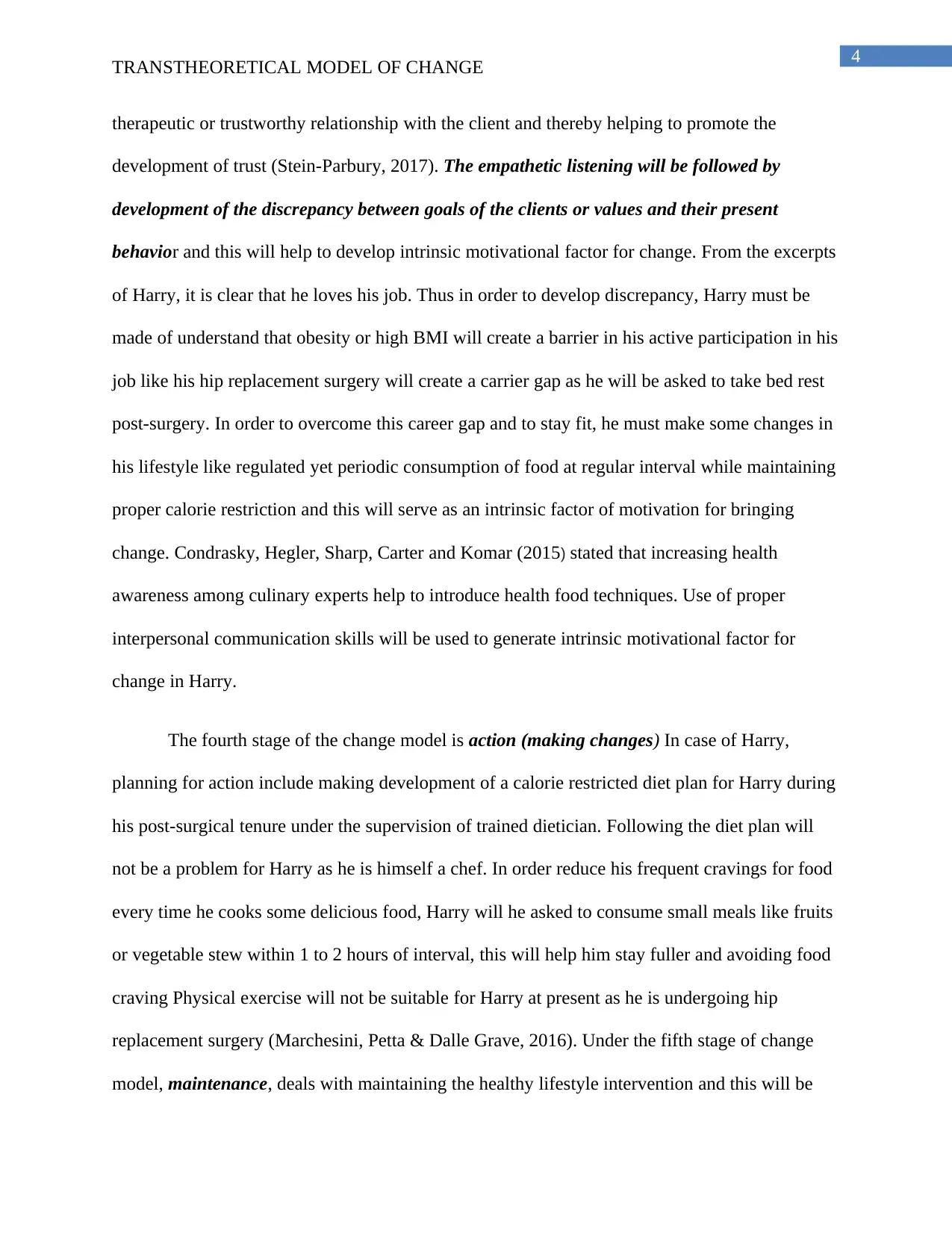
4
TRANSTHEORETICAL MODEL OF CHANGE
therapeutic or trustworthy relationship with the client and thereby helping to promote the
development of trust (Stein-Parbury, 2017). The empathetic listening will be followed by
development of the discrepancy between goals of the clients or values and their present
behavior and this will help to develop intrinsic motivational factor for change. From the excerpts
of Harry, it is clear that he loves his job. Thus in order to develop discrepancy, Harry must be
made of understand that obesity or high BMI will create a barrier in his active participation in his
job like his hip replacement surgery will create a carrier gap as he will be asked to take bed rest
post-surgery. In order to overcome this career gap and to stay fit, he must make some changes in
his lifestyle like regulated yet periodic consumption of food at regular interval while maintaining
proper calorie restriction and this will serve as an intrinsic factor of motivation for bringing
change. Condrasky, Hegler, Sharp, Carter and Komar (2015) stated that increasing health
awareness among culinary experts help to introduce health food techniques. Use of proper
interpersonal communication skills will be used to generate intrinsic motivational factor for
change in Harry.
The fourth stage of the change model is action (making changes) In case of Harry,
planning for action include making development of a calorie restricted diet plan for Harry during
his post-surgical tenure under the supervision of trained dietician. Following the diet plan will
not be a problem for Harry as he is himself a chef. In order reduce his frequent cravings for food
every time he cooks some delicious food, Harry will he asked to consume small meals like fruits
or vegetable stew within 1 to 2 hours of interval, this will help him stay fuller and avoiding food
craving Physical exercise will not be suitable for Harry at present as he is undergoing hip
replacement surgery (Marchesini, Petta & Dalle Grave, 2016). Under the fifth stage of change
model, maintenance, deals with maintaining the healthy lifestyle intervention and this will be
TRANSTHEORETICAL MODEL OF CHANGE
therapeutic or trustworthy relationship with the client and thereby helping to promote the
development of trust (Stein-Parbury, 2017). The empathetic listening will be followed by
development of the discrepancy between goals of the clients or values and their present
behavior and this will help to develop intrinsic motivational factor for change. From the excerpts
of Harry, it is clear that he loves his job. Thus in order to develop discrepancy, Harry must be
made of understand that obesity or high BMI will create a barrier in his active participation in his
job like his hip replacement surgery will create a carrier gap as he will be asked to take bed rest
post-surgery. In order to overcome this career gap and to stay fit, he must make some changes in
his lifestyle like regulated yet periodic consumption of food at regular interval while maintaining
proper calorie restriction and this will serve as an intrinsic factor of motivation for bringing
change. Condrasky, Hegler, Sharp, Carter and Komar (2015) stated that increasing health
awareness among culinary experts help to introduce health food techniques. Use of proper
interpersonal communication skills will be used to generate intrinsic motivational factor for
change in Harry.
The fourth stage of the change model is action (making changes) In case of Harry,
planning for action include making development of a calorie restricted diet plan for Harry during
his post-surgical tenure under the supervision of trained dietician. Following the diet plan will
not be a problem for Harry as he is himself a chef. In order reduce his frequent cravings for food
every time he cooks some delicious food, Harry will he asked to consume small meals like fruits
or vegetable stew within 1 to 2 hours of interval, this will help him stay fuller and avoiding food
craving Physical exercise will not be suitable for Harry at present as he is undergoing hip
replacement surgery (Marchesini, Petta & Dalle Grave, 2016). Under the fifth stage of change
model, maintenance, deals with maintaining the healthy lifestyle intervention and this will be
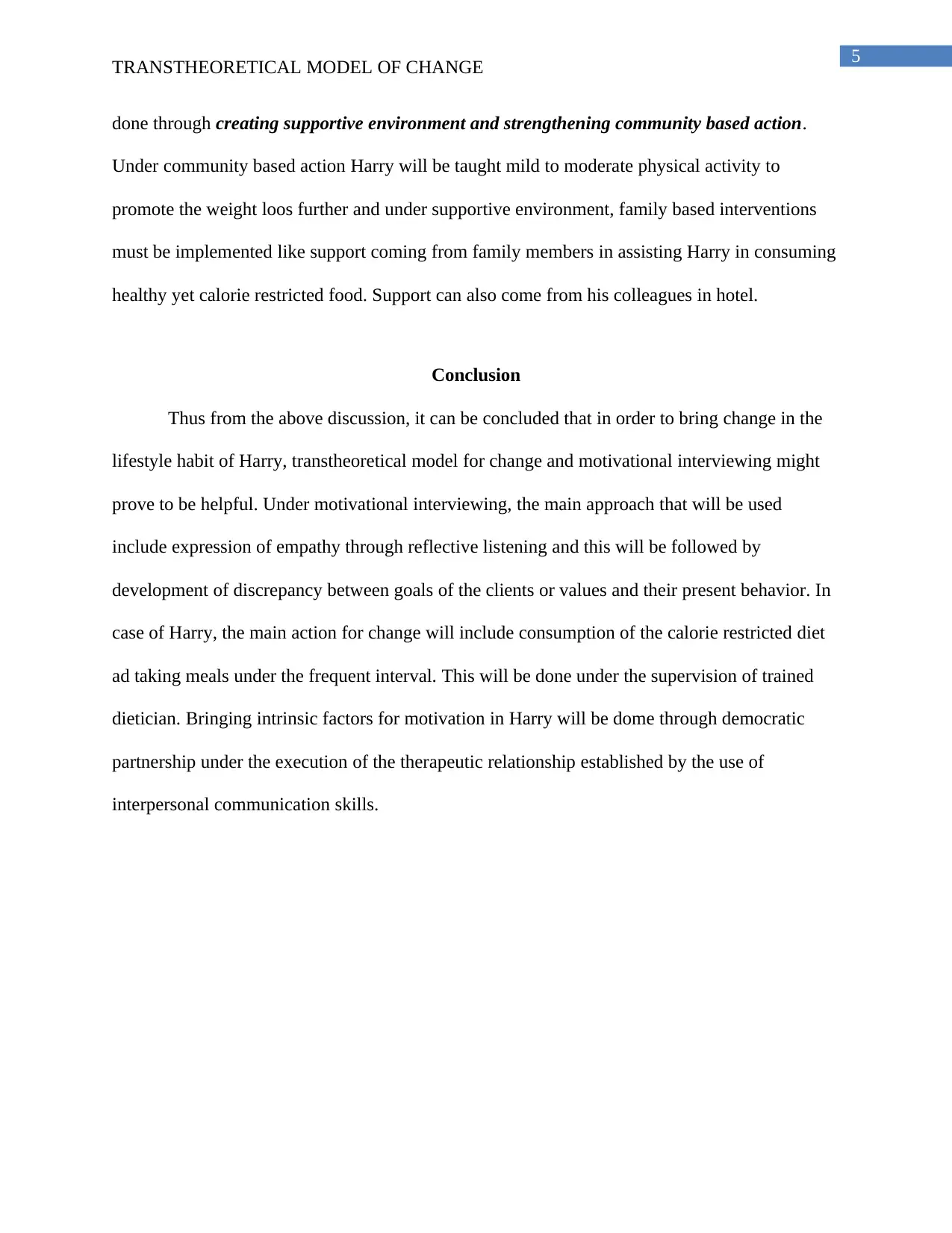
5
TRANSTHEORETICAL MODEL OF CHANGE
done through creating supportive environment and strengthening community based action.
Under community based action Harry will be taught mild to moderate physical activity to
promote the weight loos further and under supportive environment, family based interventions
must be implemented like support coming from family members in assisting Harry in consuming
healthy yet calorie restricted food. Support can also come from his colleagues in hotel.
Conclusion
Thus from the above discussion, it can be concluded that in order to bring change in the
lifestyle habit of Harry, transtheoretical model for change and motivational interviewing might
prove to be helpful. Under motivational interviewing, the main approach that will be used
include expression of empathy through reflective listening and this will be followed by
development of discrepancy between goals of the clients or values and their present behavior. In
case of Harry, the main action for change will include consumption of the calorie restricted diet
ad taking meals under the frequent interval. This will be done under the supervision of trained
dietician. Bringing intrinsic factors for motivation in Harry will be dome through democratic
partnership under the execution of the therapeutic relationship established by the use of
interpersonal communication skills.
TRANSTHEORETICAL MODEL OF CHANGE
done through creating supportive environment and strengthening community based action.
Under community based action Harry will be taught mild to moderate physical activity to
promote the weight loos further and under supportive environment, family based interventions
must be implemented like support coming from family members in assisting Harry in consuming
healthy yet calorie restricted food. Support can also come from his colleagues in hotel.
Conclusion
Thus from the above discussion, it can be concluded that in order to bring change in the
lifestyle habit of Harry, transtheoretical model for change and motivational interviewing might
prove to be helpful. Under motivational interviewing, the main approach that will be used
include expression of empathy through reflective listening and this will be followed by
development of discrepancy between goals of the clients or values and their present behavior. In
case of Harry, the main action for change will include consumption of the calorie restricted diet
ad taking meals under the frequent interval. This will be done under the supervision of trained
dietician. Bringing intrinsic factors for motivation in Harry will be dome through democratic
partnership under the execution of the therapeutic relationship established by the use of
interpersonal communication skills.
⊘ This is a preview!⊘
Do you want full access?
Subscribe today to unlock all pages.

Trusted by 1+ million students worldwide
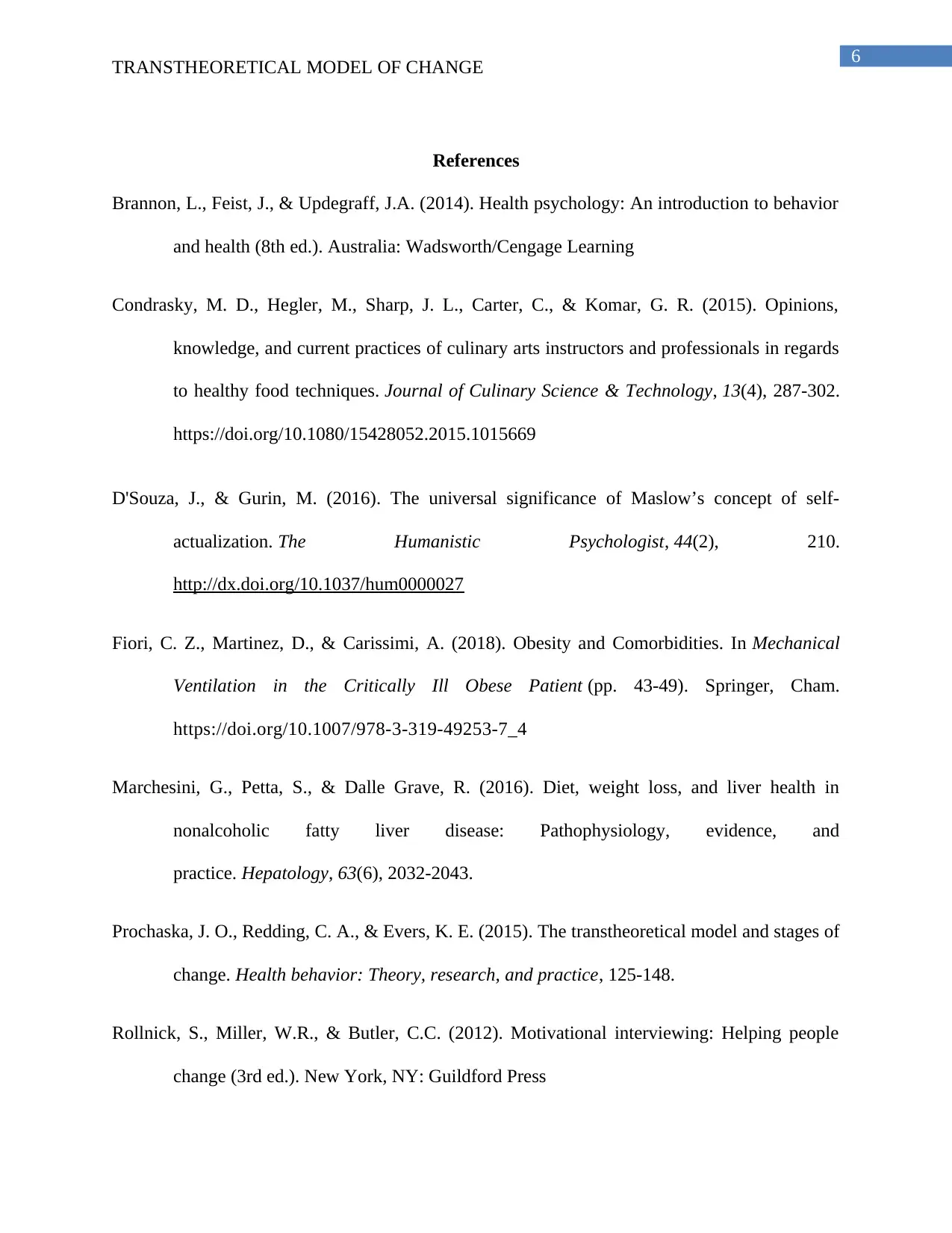
6
TRANSTHEORETICAL MODEL OF CHANGE
References
Brannon, L., Feist, J., & Updegraff, J.A. (2014). Health psychology: An introduction to behavior
and health (8th ed.). Australia: Wadsworth/Cengage Learning
Condrasky, M. D., Hegler, M., Sharp, J. L., Carter, C., & Komar, G. R. (2015). Opinions,
knowledge, and current practices of culinary arts instructors and professionals in regards
to healthy food techniques. Journal of Culinary Science & Technology, 13(4), 287-302.
https://doi.org/10.1080/15428052.2015.1015669
D'Souza, J., & Gurin, M. (2016). The universal significance of Maslow’s concept of self-
actualization. The Humanistic Psychologist, 44(2), 210.
http://dx.doi.org/10.1037/hum0000027
Fiori, C. Z., Martinez, D., & Carissimi, A. (2018). Obesity and Comorbidities. In Mechanical
Ventilation in the Critically Ill Obese Patient (pp. 43-49). Springer, Cham.
https://doi.org/10.1007/978-3-319-49253-7_4
Marchesini, G., Petta, S., & Dalle Grave, R. (2016). Diet, weight loss, and liver health in
nonalcoholic fatty liver disease: Pathophysiology, evidence, and
practice. Hepatology, 63(6), 2032-2043.
Prochaska, J. O., Redding, C. A., & Evers, K. E. (2015). The transtheoretical model and stages of
change. Health behavior: Theory, research, and practice, 125-148.
Rollnick, S., Miller, W.R., & Butler, C.C. (2012). Motivational interviewing: Helping people
change (3rd ed.). New York, NY: Guildford Press
TRANSTHEORETICAL MODEL OF CHANGE
References
Brannon, L., Feist, J., & Updegraff, J.A. (2014). Health psychology: An introduction to behavior
and health (8th ed.). Australia: Wadsworth/Cengage Learning
Condrasky, M. D., Hegler, M., Sharp, J. L., Carter, C., & Komar, G. R. (2015). Opinions,
knowledge, and current practices of culinary arts instructors and professionals in regards
to healthy food techniques. Journal of Culinary Science & Technology, 13(4), 287-302.
https://doi.org/10.1080/15428052.2015.1015669
D'Souza, J., & Gurin, M. (2016). The universal significance of Maslow’s concept of self-
actualization. The Humanistic Psychologist, 44(2), 210.
http://dx.doi.org/10.1037/hum0000027
Fiori, C. Z., Martinez, D., & Carissimi, A. (2018). Obesity and Comorbidities. In Mechanical
Ventilation in the Critically Ill Obese Patient (pp. 43-49). Springer, Cham.
https://doi.org/10.1007/978-3-319-49253-7_4
Marchesini, G., Petta, S., & Dalle Grave, R. (2016). Diet, weight loss, and liver health in
nonalcoholic fatty liver disease: Pathophysiology, evidence, and
practice. Hepatology, 63(6), 2032-2043.
Prochaska, J. O., Redding, C. A., & Evers, K. E. (2015). The transtheoretical model and stages of
change. Health behavior: Theory, research, and practice, 125-148.
Rollnick, S., Miller, W.R., & Butler, C.C. (2012). Motivational interviewing: Helping people
change (3rd ed.). New York, NY: Guildford Press
Paraphrase This Document
Need a fresh take? Get an instant paraphrase of this document with our AI Paraphraser
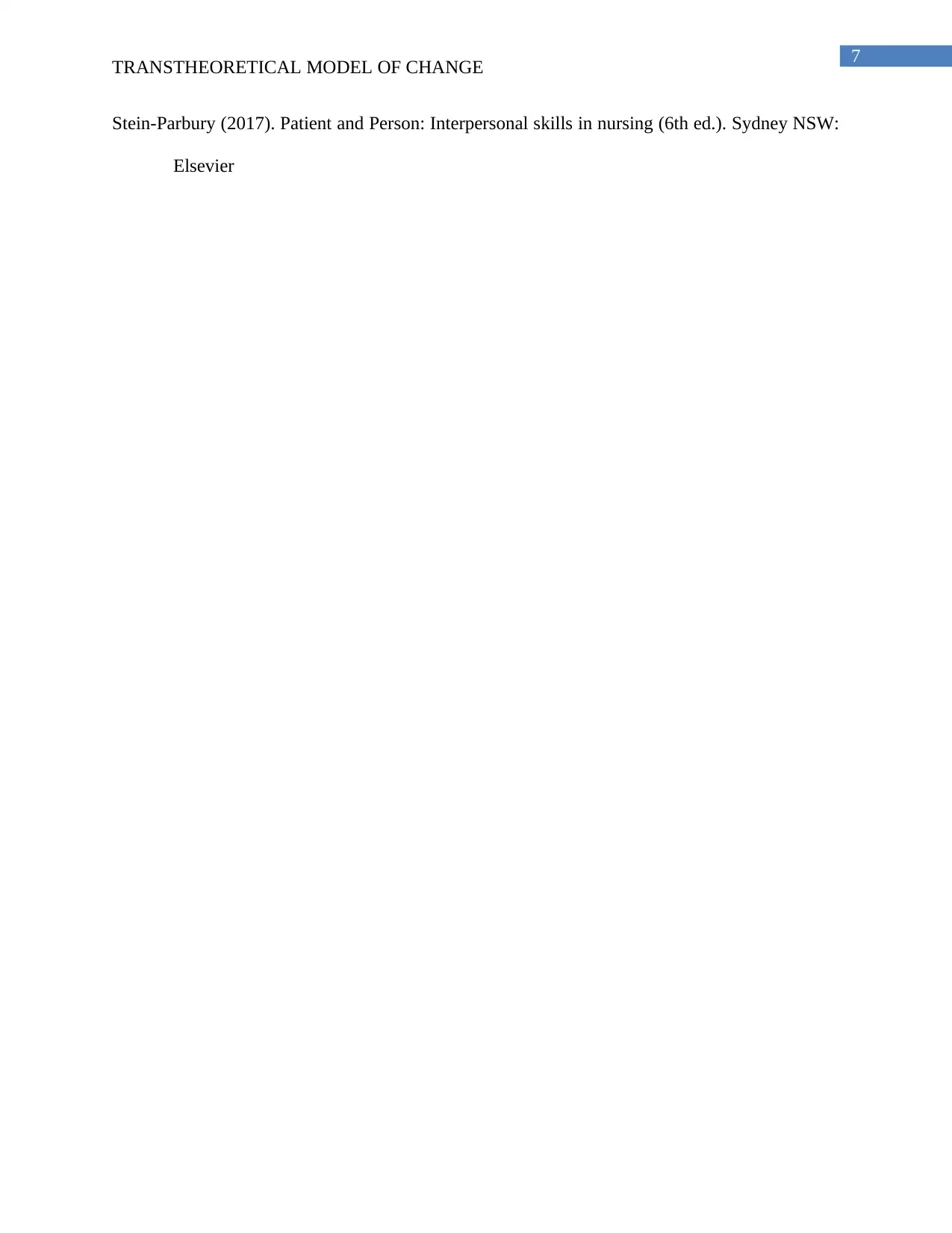
7
TRANSTHEORETICAL MODEL OF CHANGE
Stein-Parbury (2017). Patient and Person: Interpersonal skills in nursing (6th ed.). Sydney NSW:
Elsevier
TRANSTHEORETICAL MODEL OF CHANGE
Stein-Parbury (2017). Patient and Person: Interpersonal skills in nursing (6th ed.). Sydney NSW:
Elsevier
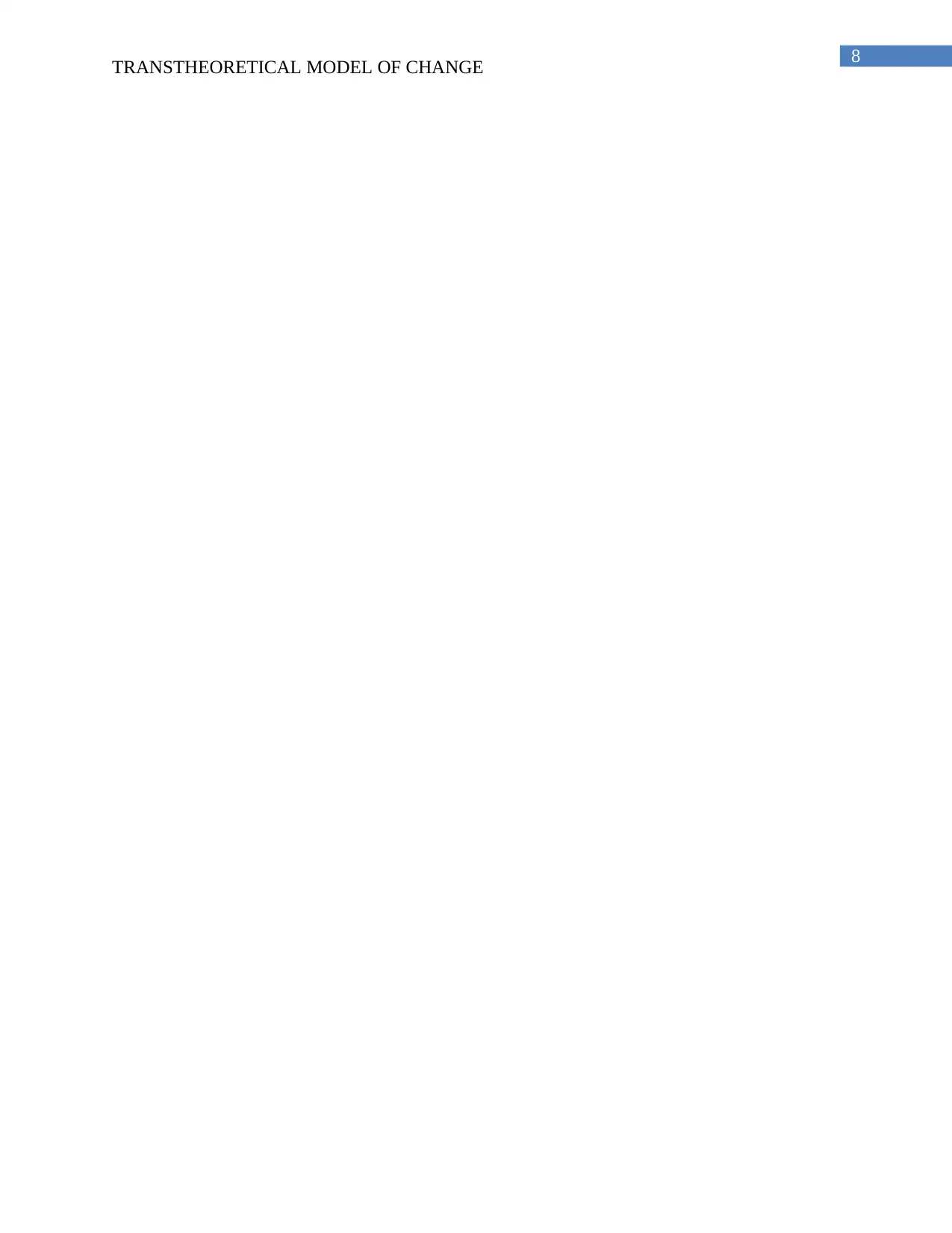
8
TRANSTHEORETICAL MODEL OF CHANGE
TRANSTHEORETICAL MODEL OF CHANGE
⊘ This is a preview!⊘
Do you want full access?
Subscribe today to unlock all pages.

Trusted by 1+ million students worldwide
1 out of 9
Related Documents
Your All-in-One AI-Powered Toolkit for Academic Success.
+13062052269
info@desklib.com
Available 24*7 on WhatsApp / Email
![[object Object]](/_next/static/media/star-bottom.7253800d.svg)
Unlock your academic potential
Copyright © 2020–2026 A2Z Services. All Rights Reserved. Developed and managed by ZUCOL.




